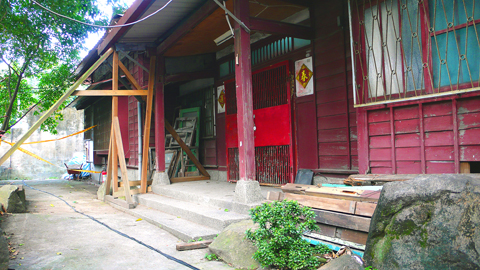The Taipei City Government yesterday started a restoration project on a group of Japanese-style houses built on Qidong Street in the 1920s in an effort to preserve the city’s largest group of such buildings.
The narrow street, located at the intersection of Zhongxiao E Road and Jinshan S Road, has a total of 10 houses built for civil servants during the Japanese colonial era. Occupying more than 6,800m², this kind of architecture has become rare even in Japan, Taipei City’s Department of Cultural Affairs said.
“The wooden structures make the preservation of historical Japanese buildings a challenge, and even in Japan, most old buildings were destroyed or dismantled to make way for urban renewal projects,” Teng Wen-tsung (鄧文宗), a division chief in the department, said during a press conference in front of the houses yesterday.

PHOTO: LIN HSIANG-MEI, TAIPEI TIMES
The area originally comprised 17 houses, but seven were torn down by Bank of Taiwan, which owned the land, in 2002.
To preserve the remaining houses, the government revised regulations in the Cultural Assets Preservation Act (文化資產保存法) and protected the houses as “temporary historical sites” before formally listing them as municipal historical sites in 2004.
Although the 10 remaining houses have been abandoned for years, the interior decorations and a total of 12 old trees are well preserved, Teng said.
The buildings show how people lived during the Japanese colonial era, Teng said.
The restoration project will cost NT$22 million (US$650,000) and will be completed next year.
Chu Chen Pao-kuei (褚陳寶貴), a local resident, said the efforts to preserve the houses were initiated by the local community. The community will cooperate with the department and the Council of Cultural Affairs to preserve the buildings, Chu said.
Lee Yong-ping (李永萍), commissioner of the department, said the restored houses would be open to the public.

Global bodies should stop excluding Taiwan for political reasons, President William Lai (賴清德) told Pope Francis in a letter, adding that he agrees war has no winners. The Vatican is one of only 12 countries to retain formal diplomatic ties with Taiwan, and Taipei has watched with concern efforts by Beijing and the Holy See to improve ties. In October, the Vatican and China extended an accord on the appointment of Catholic bishops in China for four years, pointing to a new level of trust between the two parties. Lai, writing to the pope in response to the pontiff’s message on Jan. 1’s

A Vietnamese migrant worker on Thursday won the NT$12 million (US$383,590) jackpot on a scratch-off lottery ticket she bought from a lottery shop in Changhua County’s Puyan Township (埔鹽), Taiwan Lottery Co said yesterday. The lottery winner, who is in her 30s and married, said she would continue to work in Taiwan and send her winnings to her family in Vietnam to improve their life. More Taiwanese and migrant workers have flocked to the lottery shop on Sec 2 of Jhangshuei Road (彰水路) to share in the luck. The shop owner, surnamed Chen (陳), said that his shop has been open for just

TAKE BREAKS: A woman developed cystitis by refusing to get up to use the bathroom while playing mahjong for fear of disturbing her winning streak, a doctor said People should stand up and move around often while traveling or playing mahjong during the Lunar New Year holiday, as prolonged sitting can lead to cystitis or hemorrhoids, doctors said. Yuan’s General Hospital urologist Lee Tsung-hsi (李宗熹) said that he treated a 63-year-old woman surnamed Chao (趙) who had been sitting motionless and holding off going to the bathroom, increasing her risk of bladder infection. Chao would drink beverages and not urinate for several hours while playing mahjong with friends and family, especially when she was on a winning streak, afraid that using the bathroom would ruin her luck, he said. She had

MUST REMAIN FREE: A Chinese takeover of Taiwan would lead to a global conflict, and if the nation blows up, the world’s factories would fall in a week, a minister said Taiwan is like Prague in 1938 facing Adolf Hitler; only if Taiwan remains free and democratic would the world be safe, Deputy Minister of Foreign Affairs Francois Wu (吳志中) said in an interview with Italian newspaper Corriere della Sera. The ministry on Saturday said Corriere della Sera is one of Italy’s oldest and most read newspapers, frequently covers European economic and political issues, and that Wu agreed to an interview with the paper’s senior political analyst Massimo Franco in Taipei on Jan. 3. The interview was published on Jan. 26 with the title “Taiwan like Prague in 1938 with Hitler,” the ministry